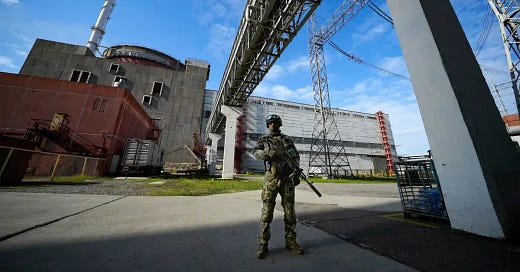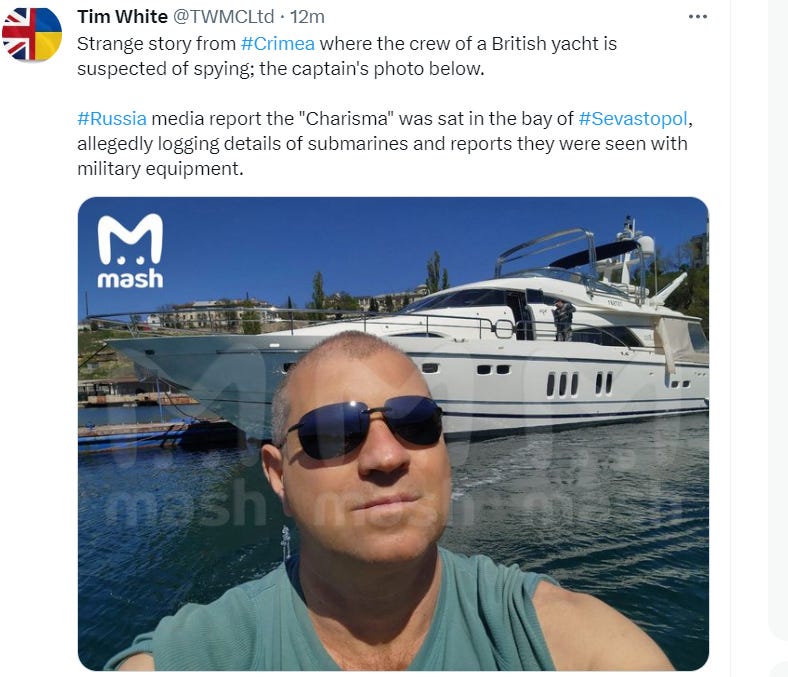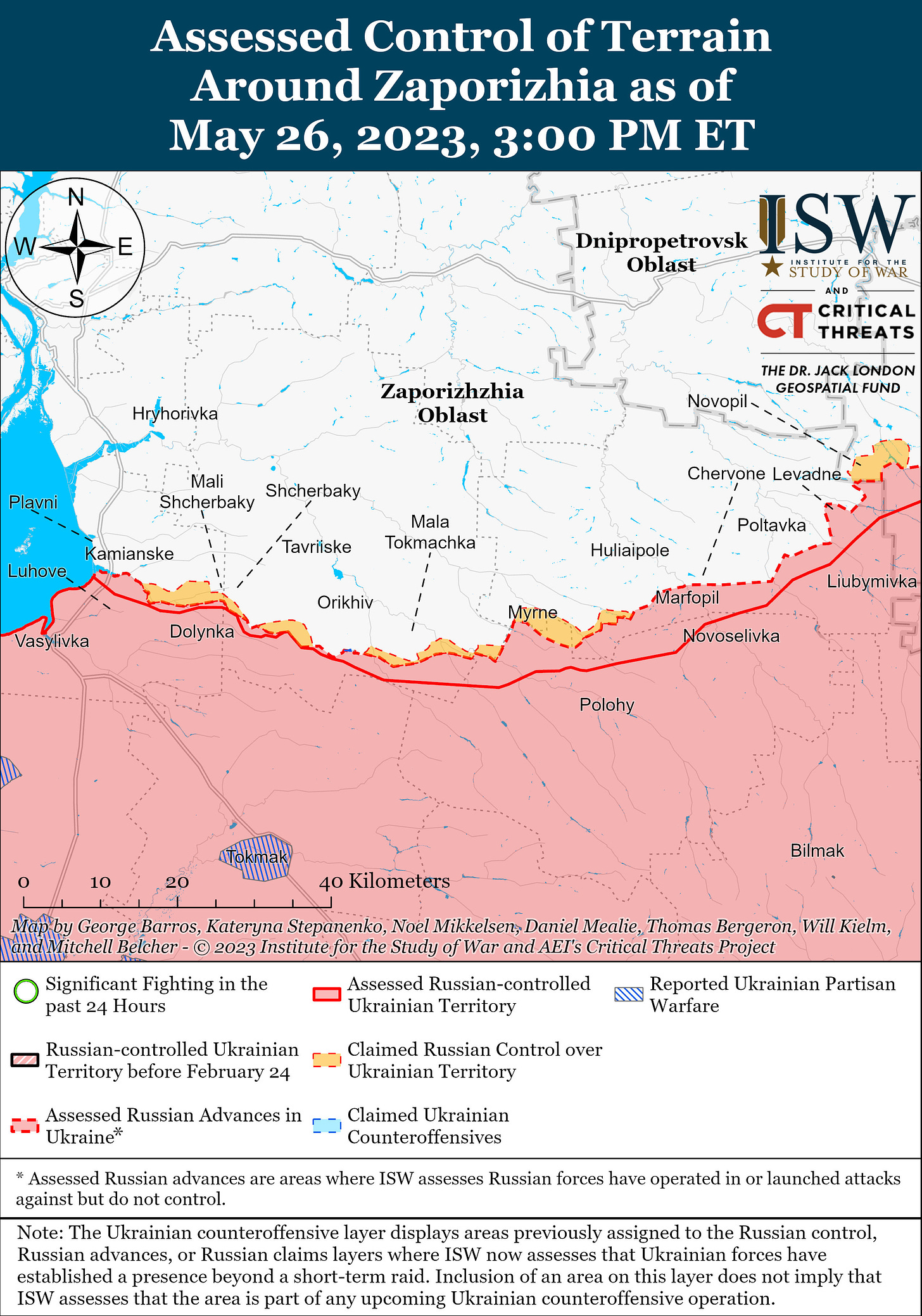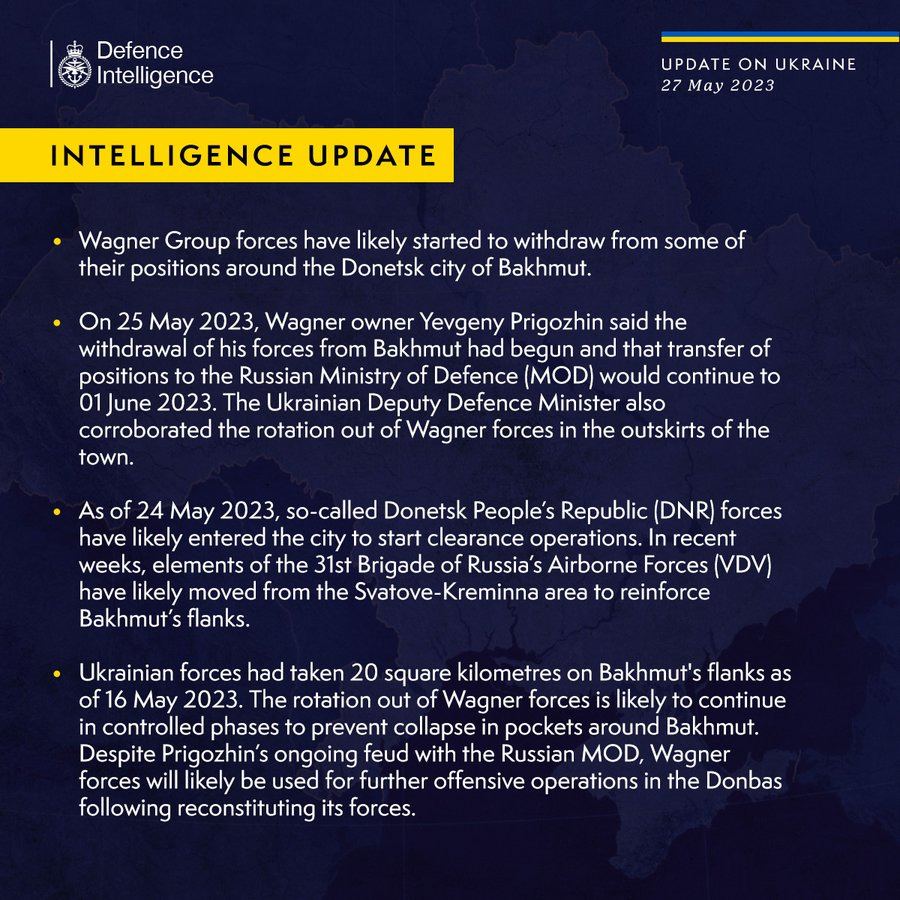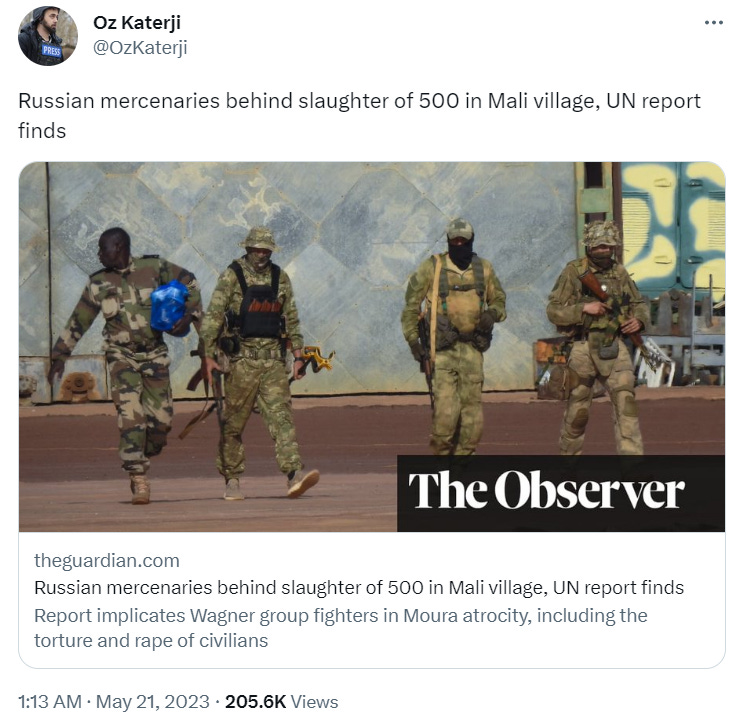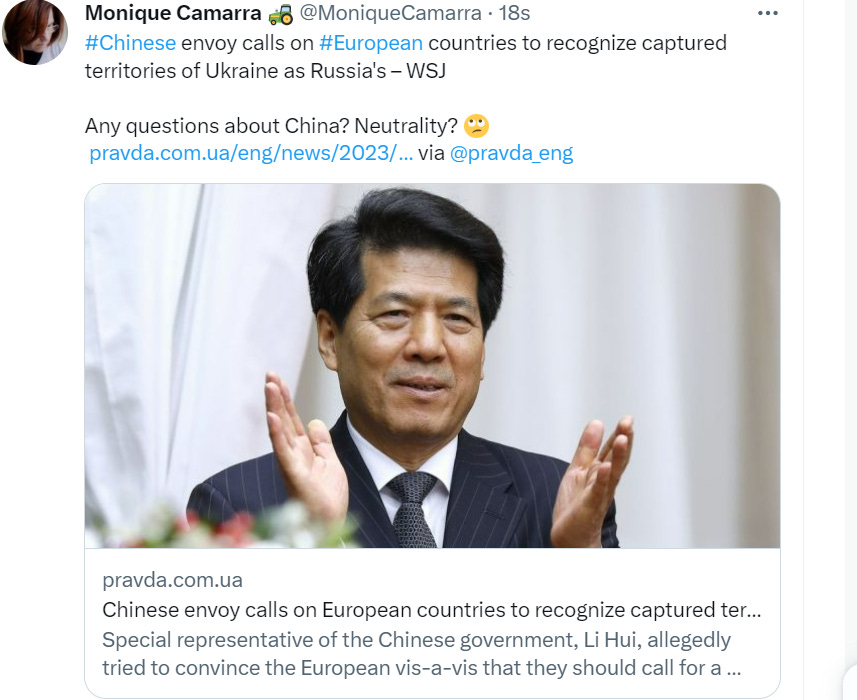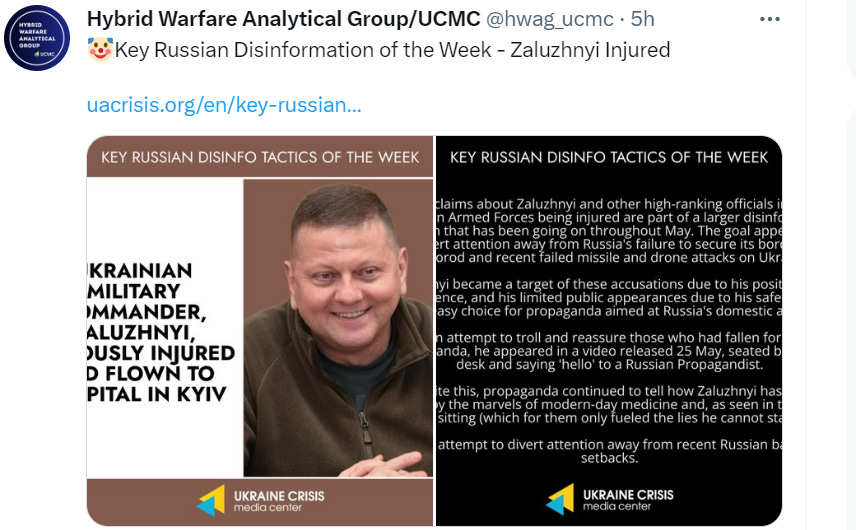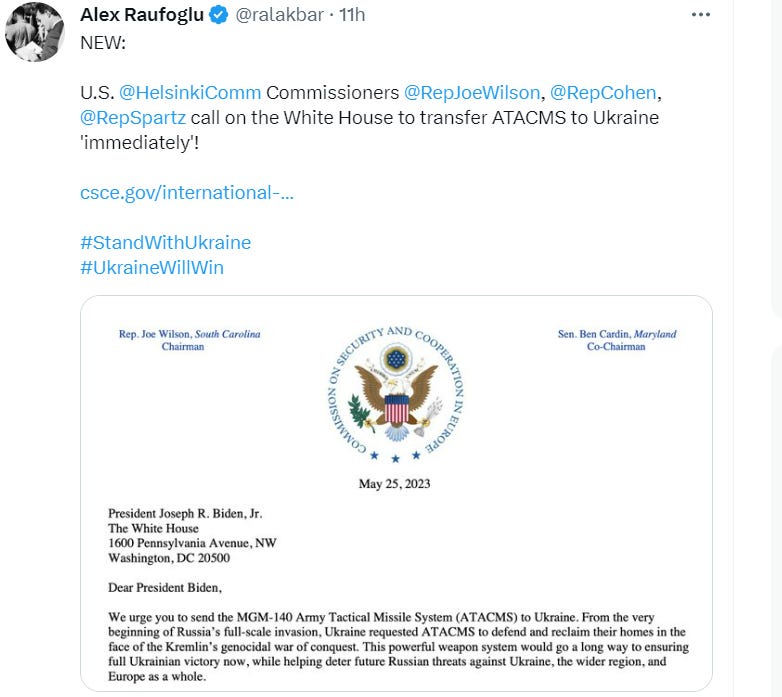May 28: Sunday Stories
Day 459: UASitRep ZNPP Danilov grain Tver Pskov Berdyansk Galuzin HUN Iran EU Georgia ATACMS GER Mali CNspying Ramstein DeSantis A&P LaGarde White UKDef ISW Katerji UCMC Savelyeva ApplebaumAtlanticRad
Catching up…
EA Worldview’s Ukraine Up-date- hop over to Scott’s amazing hourly Ukraine up-date page. I’ll fill in with some bits and bobs.
Stories we’re following…
The Russian forces are intensifying defensive operations on all fronts. They continue to try to capture Avdiivka and Maryinka and locally improve their tactical position in Kupyansk, Lyman, Bakhmut, Avdiivka, and Maryinka. There were 22 combat clashes on various fronts.
Russia attacks 16 settlements in Zaporizhzhia Oblast, killing one. Russian troops shelled 16 settlements in Zaporizhzhia Oblast over the past day, killing a 73-year-old woman and injuring two more, Governor Yurii Malashko reported on May 27. In Sumy Oblast, Russian forces targeted the communities of Seredyna-Buda, Novoslobidske, Velyka Pysarivka, Shalyhyne, Yunakivka, Myropillia, and Bilopillia, the Sumy Oblast Military Administration said on May 26.
Ukraine's military intelligence says Russia planning large-scale provocation at occupied nuclear plant. Ukraine's military intelligence reported on May 26 that Russian occupying forces at the Zaporizhzhia Nuclear Power Plant were preparing a large-scale provocation "in the next few hours."
Oleksii Danilov, Secretary of Ukraine’s National Security and Defence Council, has reported that Wagner Group fighters have withdrawn from Bakhmut but continue fighting against Ukraine, as revealed in an interview with the BBC. They are going to concentrate more on other fronts… they are regrouping to other three locations,” said Danilov.
The movement of grain caravans to the ports of Odesa is gradually resuming. Currently, there are nine dry cargo vessels in the ports of Odesa and Chornomorsk, which arrived after difficult negotiations in Istanbul between Ukraine, Turkey, the UN, and Russia, resulting in an extension of the Grain Initiative for another two months until mid-July of this year.
Authorities in the Tver region have confirmed reports of drones. The press service of the governments of the region stated that a drone “fell down” in the Andreapol district, TASS reports . There were no casualties, and emergency services are at the scene.
According to Baza, drones attacked the oil pumping station of Transneft in the Pskov region. Facades and glazing of three administrative buildings were damaged, people were not injured. Earlier, the head of the region reported on the attack of drones on the administrative building of the oil pipeline in the village of Litvinovo, Nevelsk district, without specifying the details of what happened.
2 strikes reported in Russian-occupied Berdiansk. Ukrainian media outlets reported that a loud explosion took place in facilities where occupation forces were housing in Novopetrivka, near the Russian-occupied city of Berdiansk, located in Zaporizhzhia Oblast, on the morning of May 27.
While Russia's Deputy Foreign Minister accused the West of escalating nuclear rhetoric regarding Ukraine, denying any intentions to [nuclear] bomb the country, a former Russian President warned about a potential preemptive nuclear strike if the U.S. were to deploy nuclear weapons in Ukraine. Russia combines bizarre accusations of Ukraine and the U.S. and nuclear saber-rattling.
Russian Deputy Foreign Minister Mikhail Galuzin, in an interview with TASS, listed Moscow's demands on Kyiv to achieve peace. In particular, Ukraine will have to refuse to join the EU and NATO. In addition to this new demand, the West must stop supplying arms to Ukraine, and it must cease ‘hostilities’. Russia has also demanded that the Russian language be protected in Ukraine.
Lukashenko was urgently transported to Moscow's Central Clinical Hospital after his closed-door meeting with Putin. Currently, he remains under medical care there as he can’t be moved. This is what we know. A faction of the Belarusian so-called opposition abroad claims Lukashenko was poisoned. The source of the information is questionable as the group headed by Tsepkalo spent many years in Russia. For now we know he’s not well.
Hungarian Foreign Minister, Peter Szijjártó, made a tough anti-Western statement at a rally in Serbia on Saturday: "We don't let them dictate their will to us"
"Both of our countries are facing problems and both are being relentlessly attacked by the international liberal mainstream. But why are they attacking us? Because Hungarians and Serbs are defending their national interests. Because we have strong leaders. They attack us because we we want peace in Ukraine and do not contribute to the escalation. They attack us because we are committed to family values and do not allow them to dictate their will to us."
CNN: Iran likely ships drones to Russia through Caspian Sea. Tehran is likely using the Caspian Sea shipping route to supply Moscow with weapon supplies, including the Shahed kamikaze drones, CNN wrote on May 26.
Jelger Groeneveld: Russian President Putin explains why he decided to allow flights with Georgia again: to support those in Georgia who want to normalize relations, and to provide Russian citizens with a holiday destination.
"I wanted to support those people who are trying to establish normal relations with Russia in Georgia, and also our business, simply, our citizens who love Georgia, want to go there, relax, enjoy Georgian nature, culture, cuisine," said Putin.
"I thought that the leadership of Georgia repeatedly had raised the issues of lifting visas and restoring normal air traffic, and we took this step," Putin said.
NGO: 38 Crimean political prisoners in critical health condition. At least 38 Crimean political prisoners jailed by Russia are in critical health condition, caused by the inhumane imprisonment environment, the human rights group CrimeaSOS wrote on May 25.
WHO has recorded 974 attacks against health care in Ukraine since Russia’s full-scale invasion. According to the World Health Organization, out of 974 recorded attacks, 873 impacted medical facilities. The attacks have killed at least 101 people and injured 136 others since Feb. 24, 2022.
Georgia celebrated its Independence Day on May 26: "What I have to say is that: Georgia is Europe! Europe is Georgia! and the government will not succeed in taking an anti-European position, because the majority of the population of Georgia wants Europe. And we will always state our opinion when is necessary. We are Europe!"
WSJ: Ukraine, NATO dismiss Chinese peace plan set to benefit Russia. Western officials pushed back against China's calls for an "immediate" ceasefire in Ukraine during the European tour of Chinese Special Representative for Eurasian Affairs Li Hui, the Wall Street Journal reported on May 26. Freezing the conflict would essentially mean that occupied Ukrainian territories remain under Russian control.
ISW: “The Kremlin is likely reviving its information campaign to discourage continued Western aid to Ukraine and to coerce the West into forcing Ukraine to accept concessions and negotiate on terms favorable to Russia ahead of the Ukrainian counteroffensive.”
Russians have been pushing bizarre accusations against Ukraine that the country seeks to return nuclear weapons or engage in the production of biological weapons within U.S.-operated laboratories. The chief of Russia's radiation, chemical, and biological protection forces went as far as accusing Ukraine of causing flu outbreaks in Russia, linking them to supposed "experiments that were carried out in the Askania-Nova nature reserve in Kherson, commissioned by the United States."
Ukraine asks Germany for Taurus cruise missiles. A German Defense Ministry spokesperson confirmed that Ukraine has submitted a request asking Germany to supply long-range Taurus cruise missiles, Spiegel reported.
US Treasury sanctions head of Wagner operations in Mali. The U.S. Treasury announced on May 25 that it had sanctioned Ivan Maslov, the head of operations in Mali for Russia's Wagner mercenary group. Maslov has worked "in close coordination" with Malian government officials to secure accommodations for Wagner mercenaries.
US senator meets Zelensky, calls for supplying ATACMS to Ukraine. U.S. Senator Lindsey Graham met Ukrainian President Volodymyr Zelensky on May 26 and called for supplying long-range ATACMS missiles and cluster munitions to Ukraine, news agency Interfax-Ukraine reported.
Media: NATO unlikely to offer Ukraine swift membership, considers 'upgraded relationship' instead. NATO members are unlikely to provide a swift membership plan to Ukraine, instead considering an “upgraded relationship format,” Euroactiv wrote on May 26, citing unnamed sources in NATO.
EU condemns Russia's placement of nuclear weapons in Belarus. The EU's chief diplomat Josep Borrell released a statement on May 26 condemning Russia's decision to place nuclear weapons in Belarus, calling it "a step which will lead to further extremely dangerous escalation."
Ramstein- 12th round of the Defense Contact Group
Since the last gathering, the U.S. has committed an additional $1.8 billion in security assistance to Ukraine. Since its launch, the Contact Group has committed nearly $65 billion in security assistance.
The U.S. Defense Secretary defined the results of the 12th round of the Ukraine Defense Contact Group as a show of "our shared determination to ensure that a sovereign and secure Ukraine can deter any future aggression and defend itself against future attacks."
"We believe that Ukraine has the ability and has the right, and we support Ukraine in defending its sovereignty and its territorial integrity. That includes the parts of Ukraine that Russia has illegally captured and occupied since its invasion in February of last year. It also includes Crimea, and we've made that clear," the State Department spokesman replied to a question about whether the U.S. aid is aimed at restoring Ukraine's internationally recognized borders.
"All wars end sooner or later. They end with the victory of one side or the other, or a settlement is reached through negotiations. Russia cannot win this war militarily. At the same time, Ukraine's strategic goals are to liberate all of Ukraine occupied by Russia. There are several hundred thousand Russian troops in the occupied territories of Ukraine. This can be achieved militarily, but probably not in the near future," Chairman of the Joint Chiefs of Staff General Mark Milley said.
His words resonated in Moscow, though in a distorted way. "For the first time, something was said from the lips of an office that is not a categorical support for the "peace formula of V. Zelensky." “He said that, apparently, Ukraine could not count on the return of all its territories within the 1991 borders in the foreseeable future. This is a step forward towards understanding reality "on the ground," Russia's Foreign Minister elaborated.
Interview with John McCain dating back to 2015.
DeSantis launch crashes
I was not able to listen into the launch on Thursday night because I couldn’t connect to spaces. YouTube manages 1 million viewers at times and Musk’s previous spaces, which had reached close to 500K listeners had never crashed. I’m told her repeated his talking points in subsequent interviews.
It’s much too early to predict anything in the race, especially given Trump’s legal issues ahead.
Natalia Savelyeva, Do Russians Still Embrace the War? Yes and No, CEPA
After 15 months of war, the number of Russians supporting the all-out invasion of Ukraine has fallen, but not hugely. What has changed is the nature of the support. A year ago, Russians expected a low-cost and rapid victory; now their backing is based on necessity and a fear of defeat.
According to the most recent ExtremeScan poll, support for the war fell 13% in one year — from 64% in March and April 2022 to 51% in April 2023. That is significant, but it’s clearly not enough to make the Putin regime tremble.
There is some greater light cast by other surveys, however. Russian Field found that only 27% of Russians support further military escalation while 34% want peace talks. Slightly confusingly, 33% favor both options at the same time. The trends are clear enough — backing for the war is on a slowly declining path and the issue is extremely divisive. More importantly, the reasons and justifications people use to make sense of the war have shifted.
By the fall, people had fully embraced the war’s existence as a “nothing-to-be-done” reality. “This is how things are, what can you think about it?”, a 52-year-old university professor asked. “Everyone understands that it’s impossible to end it [the war] in one day. I don’t understand what we’re hoping to achieve . . . but I do understand I am not able to stop it . . . like anyone else, I want it to end as soon as possible.”
Disempowerment, a lack of understanding of the reasons and goals for the war, and depoliticization together produce an unexpected result: a desire to find solid ground. The solid ground is my country, right or wrong.
Programming note…
Host Hanna Rosin talks to Atlantic editor in chief Jeffrey Goldberg and staff writer Anne Applebaum about their trip to Ukraine, their interview with Ukrainian President Volodymyr Zelensky, why continued American support is necessary, and why flagging attention doesn’t matter.
Background: Read Goldberg and Applebaum's latest article The Counteroffensive and see the battlefield drones and drone workshops they talk about in this episode.

